It's not quite a hole in the ground and Gandalf is not – yet – blowing complex smoke rings of dragons chasing pirate ships, but there is a still a welcomely ruminative, smoky, timeless ambience. We are sitting, Mr McKellen and I – he's not one of those who goes too big on the "Sir" stuff – in the tiny top room of the ancient waterside Limehouse pub the Grapes, which he co-bought a couple of years ago. There are candles, there are golds and reds, there's a big mutual ashtray, and outside the shaking windows the dirty Thames is growing darker, wilder and woollier by the minute.
He is talking of Dickens, who wrote about this place, very possibly this high room, as "forever falling into the water". I am thinking, more, about my first meeting with Mr McKellen, something like 35 years ago, when I interviewed him for my school magazine, the RSC having played in our school gym that Edinburgh festival. With incalculable luck I've managed to dig out a copy, just to remind myself what badly Xeroxed typewriting looks like and how excruciating my interview technique was even back then – it's simple Q&A, and fawning questions, but one does stand out between his (lengthy, thoughtful, unpatronising) answers, and it runs thus: "Q: Have you ever thought seriously about going into films or television?"
Today we both wear specs – neither pair too effective in the darkling light from the stormy windows; he's delighted by the half-memory and takes the photocopy of my photocopy to pore over later. We can forgive much about our younger selves, but that question in particular does seem daft, given that the man before me is about to star in probably the year's greatest blockbuster, The Hobbit, reprising – or is "preprising" yet a word? – the role of Tolkien's wizard which won him worldwide fame over the past decade during the slow, complex and ultimately triumphant New Zealand filmings of the author's later Lord of the Rings trilogy.
"I do think I used to be a bit snobbish about the cinema and think the real acting took place in the theatre," he muses as he tries to remember what the answer had been (he'd said then: "I've never met a film star who's happy…").
"But perhaps that was simply excusing my disappointment that I wasn't in cinema like some of my contemporaries – Tom Courtenay, Alan Bates, latterly Tony Hopkins. My friends tell me I was always saying: 'Why aren't I in movies?', but I wasn't because I was always on tour, on stage. And also, because of that, I knew I had to learn how to be a film actor. And so when I'd set up the film of Richard III I deliberately took very small jobs in other people's movies – Meryl Streep, Arnold Schwarzenegger for goodness' sake, Alec Baldwin – and I just began to see what they were up to, so that when it came to the real thing I felt that bit more confident. And I suppose it was a good calling card, so producers could go: 'Hmm, maybe McKellen's a bit more than just a classical stage actor.'"
He has loved the transition to movie superstar at a relatively mellow age – he's now 73. "It's easier to go from theatre to film than the other way round. In film you're absolutely loved and cossetted and cared for. In film your director makes your performance. In theatre you're carrying it all. But films appeal to me because I'm still intrigued by how to do them. I'm so pleased that I seem to be able to act in films, not waving and shouting too much, just to be heard in the gods." And he didn't, as many seem to, mind the concomitant fame? "Goodness no. And I travel on the tube. What's nice for me, having identified myself for years as being rather shy, is now, wherever I am, in public, there tends to be a friendly face who's pleased to see me, and I like that. And for someone who doesn't have grandchildren, it's lovely for me to meet those of friends, eight or nine years old, who actually want to have a chat to me – that's great. And yes, they absolutely understand I'm not Gandalf, I'm only an actor. All the world's a stage etc, and kids are so used to play-acting anyway: they absolutely get it, no problem. Sometimes they might say: 'Will you sign this as Gandalf?' and I say: 'Well, no, Gandalf isn't here,' and they go: 'Of course.'"
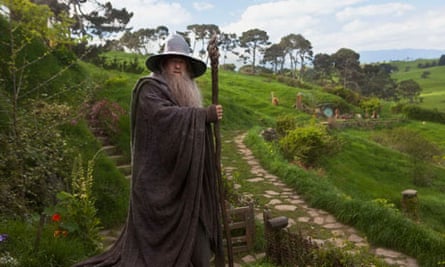
There is, between the two of Tolkien's filmed books, a difference not only in size but in mood. Filming for The Hobbit finished mainly in July, though McKellen has to go back Down Under for five weeks next year for extra scenes. Since then he's been back in London, catching up with friends, settling into running a pub within sight of his home, and learning – in his words – that chefs can be every bit as "difficult bloody divas" as actors. Presumably the end result, the long-awaited Hobbit, reflects the mood of the writing?
"Absolutely. Tolkien wrote The Hobbit first, and wrote it mainly as a simple adventure story. It was written almost in the first person, his own voice, and it's a tale of the old world, and Bilbo is simply going on an adventure. In Lord of the Rings it's war, written as real war loomed, and they're going off to save the world: it's big and it's serious.
"But this one is full of fun, and humour, in a way which wouldn't really have been appropriate in Lord of the Rings. Martin [Freeman] is, apart from anything else, a great comedian, as, of course, are Billy Connolly, Stephen Fry, Jimmy Nesbitt. Also, in this one I am, throughout, Gandalf the Grey. In Lord of the Rings, two of them anyway, I play Gandalf the White, kind of post-resurrection, and there's a different feel to him; a certainty. But Gandalf the Grey likes boogieing around Hobbiton and having a drink and a smoke and letting off fireworks."
As, it strikes me, does McKellen himself in his fashion, who is just about to start work on a sitcom with Derek Jacobi, about, essentially, two argumentative old queens living in Soho. "Well, you know, I just hadn't done a sitcom before. Hadn't worked with Derek before, oddly, even though we've known each other since Cambridge, and it seemed a bit of a lark, and the writing is funny, better than funny. And we are capable of absorbing each other's cantankerousness – the characters have been together for 50 years, so there's a basis of love which supersedes the viciousness, as with heterosexual marriages."
It is still a risk, however – a prime-time ITV sitcom, filmed live before an audience. You're never too old to fail. And it strikes me that something has changed from the McKellen who told the Observer a decade ago that he was happily in love, and considering winding down, and travelling much more, and letting go more than a little. What had happened? Was he, for instance, still with the same chap?
"No, no, I'm on my own." Happily so? "That, for the Observer, is rather a cheeky question, but I suppose yes. If I wasn't I'd presumably go out and do something about it. But, on your wider note, it turned out that despite travel and the other things, gratifying as they are and were, I still needed to act. That's what I'm best at. And as long as other people want to go on employing me, in whatever capacity, it would be perverse not to. It keeps you alert, part of the world – you're not forever being nostalgic… you don't decline into self-satisfaction. Now rather than thinking: 'When can I take six months off?', it's: 'When can I work again, by God how much time do I have left, I'd better do another job.'"
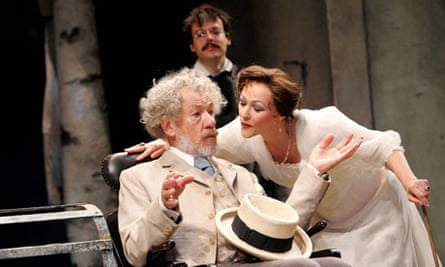
Ten years ago, he says, he probably gave that answer to us because he was around retiring age and thought he should be winding down, rather than actually meaning it. "Actors don't, in fact, retire, do they? It took me a while to remember that. And the fact that I'd always wanted to have a career. Those I admired – Gielgud and Olivier, Richardson – they'd all had careers, not just famous for one thing; they'd had their ups and downs but they'd always kept going. And there's always the sense of… not much longer for this part. At one age it's: 'Hell, not much longer to play Romeo, or Hamlet,' then it's soon: 'I'm going to be too old for Macbeth.' All right, Lear's always there."
Part of the key to longevity must surely be adaptability. "Yes, but that's not a problem, because that's been part of the fascination for me, always, in any medium." First, he says, having loved listening to the radio, he was simply delighted to be on it to find out how it was done. "Then television, and how is it done? Why and how did they go for that shot? So I would never find myself saying: 'Oh I can't do that, it involves something new'. Rather, I hope I'm intrigued by it. Not to say I find something like CGI, say, necessarily easy, but it can be coped with. Like so much of acting, it's to do with technique.
"Perhaps in the past I've been too technical an actor – well, other people have said it of me – but if you're making The Hobbit you've got to know how to cope with the problem of making yourself look much larger than all the other characters. Even when they're not there." He is, for instance, technically taller than Martin Freeman but not by much more than a jug of Bree's finest hobbit ale. "So I have to act with Martin, when we're actually together, looking at his belt, and he has to act looking at the top of my hat, and then to the camera it looks as if he's much smaller. But it's all just technique, similar to coming on to a stage and hitting your mark, making sure you're in the light and the rest, just a bit more of it."
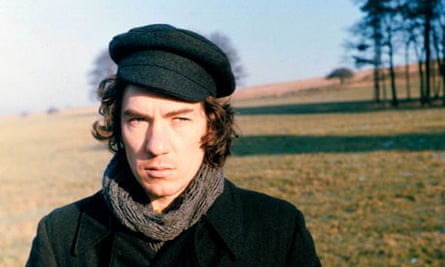
Are you still learning? "Oh good lord, yes, absolutely. I might have thought, when younger: 'Right, I think I've pretty much now sorted out how to do, say, Black Coffee by Agatha Christie.' But that's about it. Always, I'm still learning. I hope. And I feel that more and more, as I age. Anyone of my age feels that the end is… in touchable distance. And who knows, it may suddenly come up behind and hit you on the head. And your friends are… dying, or incapacitated in some way. And I think I've decided now that I'd rather like to keep going, as far and as long as I can."
And ideally, he says, with parts where he can bring something of himself – he'd still love, he says incidentally, to do something with Mike Leigh – because "that's part of the fun, always part of the fun. With Shakespeare, for instance, you have to think: 'Can I imagine myself doing this? What within me would support doing this? Can I actually imagine killing Duncan?' Well, I can certainly understand the motives, the confusions. And personally I know about guilt, and paranoia, and regret."
All parts, even Gandalf? "Well, aspects, most certainly. He likes going out. Likes laying down the law. I love both, on occasion, with… yes, benign affectionate tetchiness. I don't have Gandalf the White's certainty about everything." Perhaps, I suggest, because he doesn't echo his quasi-religious feel, having eschewed religion in this real world. "That is a part of it. What I do have is Gandalf the Grey's ability to worry about things. There's got to be some truth of you in all the best parts. And that's why I did enjoy it all so. That and, to be honest, the fact that I still get a bit starstruck. I can't believe my luck! I'm in a room with Billy Connolly, touching him, hugging him, and he's teaching me how to play the banjolele, which he gave me. Chatting to Stephen Fry, for free, and they're nice to me, think I have something to offer. And young people, too, offering me the time of day. What a business to be in, and to still be in!"
He gives a sonorous chortle that seems to rattle rafters; and there's genuine self-deprecation at his luck in finding himself in such company. I suspect that messrs Fry and Connolly – who grew up watching this man segue from gar- landed stage-thesp to tireless campaigner (Stonewall, women's and children's rights) to Hollywood catnip to that dreadful position for anyone with a fine remaining sense of mischief: being on the cusp of national-treasure status – were equally conscious of the company they were in.
But he wants briefly to be back with wizards. "Gandalf is trying to do good. And basically I'm on the side of people trying to make this world a better place. Rather than keep it as it was, or even imagining a golden future. But simply getting through life without hurting too many people." Are we in a better world than the one into which he was born? "Entirely better, personally. At least in the country we live in, there's an acceptance and a generosity and inclusiveness which has allowed us to accept alien cultures and learn from them. And attitudes to gay culture, and then disability, I hope more than momentarily. In so many ways better, and I am so glad."
He's late to return to his house guests, so courteously takes his leave, pausing to check with his manager about early Christmas bookings, cast an eye over table settings and compliment her on her looks, then bounce away dangerously fast down rickety stairs after a winning and grinning handshake. A rounded, grounded man, who seems determined to the end to pull out a few fresh stops, happy just to be given the chance, and maybe just blow a few more dragons after a few more pirate ships.
.
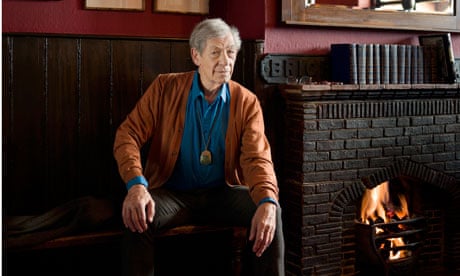

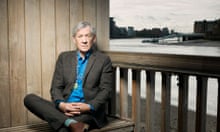
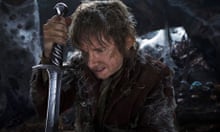
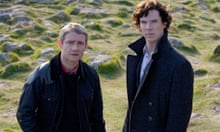
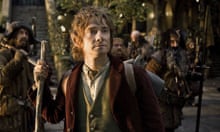


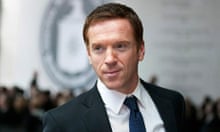
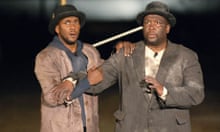
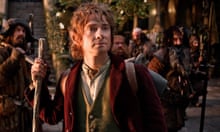
Comments (…)
Sign in or create your Guardian account to join the discussion